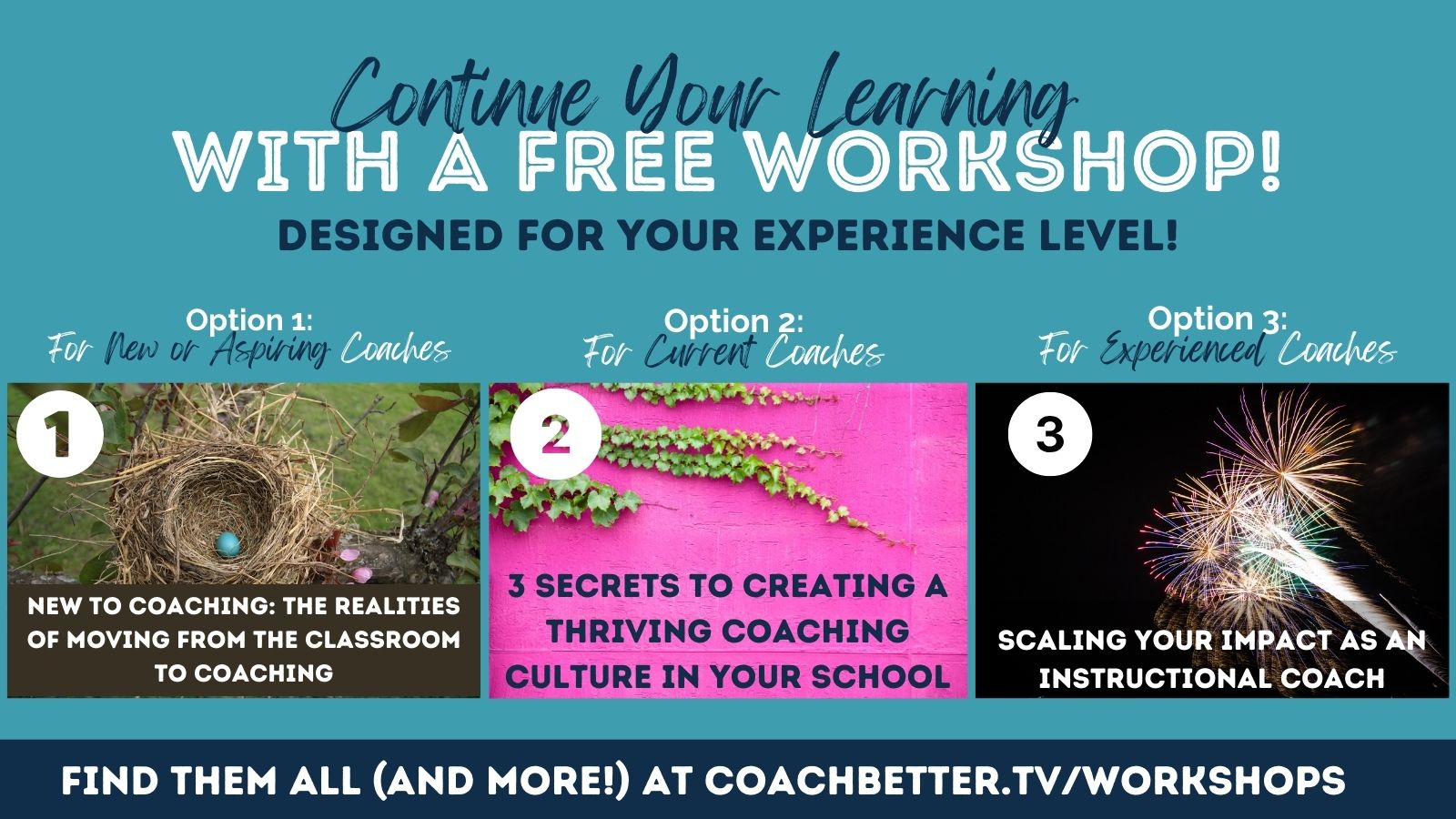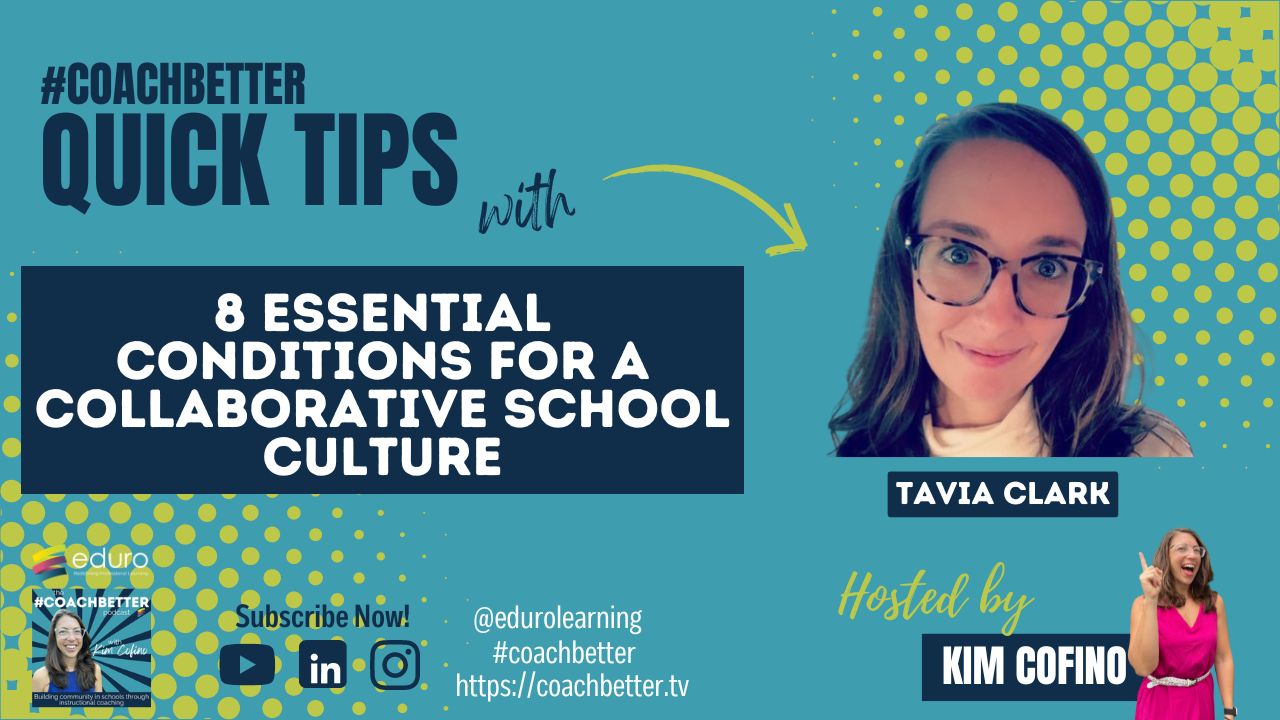When we think about creating a coaching culture, we want our colleagues to feel safe, supported and ready to take risks.
That’s all part of creating a collaborative school culture.
This is a highlight from one of my favorite episodes from a previous season, with innovative educator, Tavia Clark. I’ve been wanting to share this clip for quite a while, because it’s a participatory and collaborative culture that will help make coaching thrive. When educators want to work together, when we can see our colleagues as people who help us become better educators, it’s a lot easier to opt in to coaching.
On this channel I talk a lot about creating a thriving coaching culture, and that kind of culture doesn’t just support more coaching, it builds a sense of collective efficacy that creates an environment where teachers want to stay and grow. Of course, this doesn’t happen in isolation, we need many different factors working together, and this clip from my conversation with Tavia does a great job of highlighting 8 of those key elements.
If you’re working towards building a coaching culture, this post is for you! And if you’re starting to think about how you might be able to lead this work, as a coach in your school, you might want to consider joining us for the next global cohort of Coaches as Leaders (more at the end of the post).
What’s YOUR level of coaching mastery?
All coaches go through various stages of coaching mastery. Once you identify where you’re at, you can begin to build the skills needed to move to the next stage.
This quiz is based on real-life case studies compiled from years of working with coaches inside The Coach Certificate & Mentorship Program!
When you receive your results, you’ll also get your matching case study from the STRIVE Case Studies to see where you fit in the stages of coaching mastery.
Ready to tackle your challenges and move on to the next level in YOUR coaching practice?

The STRIVE Model of Coaching Mastery quiz will help you identify your level of coaching mastery by matching you with case studies compiled from years of working with coaches inside The Coach Certificate & Mentorship Program so you can easily see where you fit!
When you complete the quiz, you’ll get:
- Your matching case study,
- Specific strengths & challenges aligned to your result;
- Suggested next steps for each stage;
Plus the Case Study Document includes:
- Case studies leveled by coaching mastery;
- A framework to identify essential stages of professional growth & key areas to focus on in your professional learning;
- Alignment with the THRIVE Model for a Successful Coaching Culture;
- Space for you to reflect & prioritize so you can take action immediately!
You’ll go straight to the Quiz, and get the Case Studies by email
The 8 Conditions
Tavia describes 8 specific conditions that create a participatory culture, that reflect the fact that in education we are constantly transforming & growing and learning.
They are:
- Creating a participatory culture that practices both communication and collaboration. Feel like things are being done “to me”, not “with me” or “for me”. Participatory means building trust.
- There has to be buy in from leadership. As a leader you have to be willing to allow for your people to take risks, to fail, to figure out within that failure what is the opportunity to grow.
- Leadership has to be committed to learning alongside staff.
- In creating that kind of culture, we have to stop assuming that everybody knows how to collaborate. We have to work on communication skills that it takes to be able to collaborate (it’s not divide and conquer), practice communication skills (role play).
- Commitment to professional learning. In a way that’s low stakes, not in front of students.
- Spend a little more time with affirmations & celebrations of success in growth and learning. Celebrating the glows and the grows, builds excitement.
- Provide resources: time, money & human capital. We have to start investing better in our people. Distributed leadership, what opportunities do administrators have to distribute leadership. Investing in coaching. Coaches are the glue that keep it all together, they create the connections between people and plans.
- Transparency about expectations: how do strategic plans and student achievement
When you think about the culture in your school right now, how many of these are in place? Are the supporting the development of your coaching program? What might you work towards developing next?
Watch the Video
Keep Learning
If you’ve been a coach for a while, you know that the school culture has a HUGE impact on your success (or your challenges). The wonderful thing is that as a coach, you have the potential to leverage your skills to help build a culture that supports instructional coaching.
If you’re ready to think about your coaching practice and program from this big picture lens, and you’re curious about embracing your leadership as an instructional coach to see the ways that you can build a culture of coaching, make sure to watch our free workshop for experienced coaches, Scaling Your Impact as an Instructional Coach. You can find it at edurolearning.com/scale
After you’ve been a coach for a few years, you know that you can’t just keep working 1:1 with every colleague on staff – that’s a ticket to burnout. Scaling your impact requires that you shift your mindset from seeing yourself as “just a coach” to seeing yourself as a leader, so you can create and advocate for the systems and structures that make coaching sustainable – for you as an individual coach and for your coaching program in your school.
Watch the workshop at edurolearning.com/scale
And, if you discover that you need support as you go through the process, join us for our next global cohort of Coaches as Leaders – designed for experienced coaches ready to advocate for and build the systems and structures that are needed to truly sustain a coaching culture..
In Coaches as Leaders we’ll help you recognize exactly which systems and structures you need (and might be missing in your school setting) so you can make your coaching culture sustainable – and you can scale your impact beyond working 1:1 to working with teams and groups.
Registration opens only once a year!
Get all the details at edurolearning.com/cal
Free Workshops for Instructional Coaches
If you’re ready to keep learning, try one of our FREE workshops where you’ll be able to dig deeper into the concepts in this post, and get a peek at all of our courses for coaches.
We have workshops (and courses) to support coaches at every stage of their career: from new and aspiring coaches making the move from classroom to coach; to current coaches ready to be more intentional and strategic in their practice; to established coaches leveraging their coaching experience to lead.

You can them all on our coachbetter website at coachbetter.tv/workshops
If you’re curious right now, you have questions, please reach out. You can leave a comment below, join our #coachbetter Facebook group, or find us on social media at Eduro Learning and send me a DM. I’d love to support you on your coaching journey. See you next time!
Connect with us!
Subscribe to the podcast iTunes |Spotify|Stitcher
Follow us on social media: Instagram |LinkedIn
Join our #coachbetter Facebook group

Recent Comments